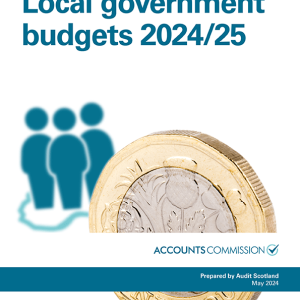Publication: Benchmarking and good public performance reporting matter

Benchmarking and good public performance reporting matter
Blog: by Mike Neilson and Derek Yule, members of the Accounts Commission for Scotland
The Accounts Commission reinforce the importance of the Local Government Benchmarking Framework
The latest LGBF annual report shows that the pace of improvement in councils is slowing, with 2022/23 the first year that the rate of decline in indicators has overtaken the rate of improvement. This is against a backdrop of growing financial, demand and workforce pressures.
Using data on how services are performing is ever more important as councils must make increasingly difficult spending decisions, alongside decisions about allocating limited resources.
Making good use of performance data to plan and improve services is a key aspect of the duty of Best Value that applies to all Scottish councils and local government bodies. Best Value matters because it focuses on improving lives and services for local people, alongside using resources effectively.
To deliver Best Value, councils need to report to local communities in a clear and balanced way on how well services are performing and plans to address areas of poor performance. This is an area that all Commission members have a significant and ongoing interest.
The Local Government Benchmarking Framework (LGBF) plays a key role delivering Best Value and effective and transparent reporting of performance. The Commission has supported the framework since its launch in 2013 and is hugely encouraged by the Improvement Service’s launch of an interactive dashboard that allows users to explore LGBF data at both a national and local level. This improves the accessibility of performance information to councils, other stakeholders, and vitally, the public.
We expect councils to use the LGBF as part of their approach to self-evaluation and performance reporting using the underlying principles of:
- Transparency and clarity in the public information that shows delivery of local priorities and the performance of services
- Comparison and benchmarking with councils with similar populations and areas (family groups) to drive improvement
- Trends in performance over time so the direction of travel is clear.
- Driving decision-making through the use of performance data to identify improvement priorities,
- Effective scrutiny by councillors of service performance, delivery of strategic priorities and improvement plans.
We’re working closely with the Improvement Service as they continue to develop their approach to further support councils to use the LGBF data effectively.
We’re very interested in the work being done to help councils create small groups or baskets of indicators that are most relevant to their local priorities. We are excited to see how this will help councils show the public how they’re delivering against their local priorities and in other important areas such as monitoring their financial sustainability, cross cutting issues and shift to prevention.
We will be following national and local progress in this area with keen interest.
As the national scrutiny body for Local Government, we direct councils to report on performance through our Statutory Performance Information Direction. In our Direction we have chosen to rely heavily on the LGBF because we believe this, alongside self-assessment, are at the heart of improvement. We are currently reviewing the Direction, looking to incorporate the key principles and developments we’ve highlighted above, to ensure it provides the best possible framework for improvement.

Mike Neilson and Derek Yule, members of the Accounts Commission for Scotland.






